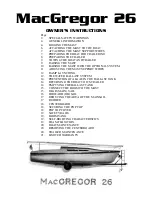
Cobalt_OM_preprint_shell.fm Page 1 Wednesday, March 1, 2006 5:39 AM
296 Owner’s Manual
2
-
9
R
ESPONSIBILITIES
AND
S
AFETY
Distress Signals
Federal law also requires boats 16 ft (4.8 m) and
longer to carry day and night visual distress signals
when operating on coastal waters, the Great Lakes,
territorial seas or those waters directly connected to
them, up to a point where the body of water is less
than two miles wide. Carry several types of
signaling devices to handle a variety of conditions.
Have enough signals onboard to last three days.
Radio Communication
Radio communication is the most important avenue
of receiving and sending information. Use a
VHF/FM radio for short-range communication, and
a single-sideband radio (SSB) for long-range. For
all U.S. waters, the National Weather Service
operates the NOAA Weather Radio (NWR). This
service provides continuous weather information on
the following VHF/FM frequencies:
• 162.400 MHz • 162.500 MHz
• 162.425 MHz • 162.525 MHz
• 162.450 MHz • 162.550 MHz
• 162.475 MHz
Coast Guard Marine Information Stations
• 2670.0 kH • 8765.4 kH
• 4428.7 kH • 13113.2 kH
• 6506.4 kH
It is good practice to periodically monitor the
weather.
Lifesaving Equipment
The following equipment may or may not be
required by federal/local regulations.
Personal Flotation Devices
Federal law requires at least one Type I, II, III or V
Personal Flotation Device (PFD) for each person
onboard or being towed, and at least one Type IV
throwable PFD in the boat.
There are four types of PFDs to wear and one type
used for throwing in emergency situations.
Type I Life Preserver: Most buoyant PFDs are
effective on all waters, especially open, rough
water.
Type II Buoyant Vest: Good for calm water near
shore on most inland waters where quick rescue is
likely.
Type III Flotation Aid: Good for most inland water
applications where quick rescue is likely. Comes in
various styles and some are designed for water
sport activities.
NOTICE: Some pyrotechnics are
restricted from use on certain
bodies of water, so check with
local authorities.
TYPE I
LIFE PRESERVERS
KC-0041C
TYPE II
BUOYANT VESTS
KC-0051C
KC-0042C
TYPE III
FLOTATION AIDS
Summary of Contents for 296 BOWRIDER
Page 6: ...vi 296 Owner s Manual COBAL T 296 BOWRIDER NOTES ...
Page 26: ...1 20 296 Owner s Manual COBAL T 296 BOWRIDER SECTION 1 NOTES ...
Page 96: ...3 42 296 Owner s Manual COBAL T 296 BOWRIDER SECTION 3 NOTES ...
Page 99: ...296 Owner s Manual 4 3 SYSTEMS FUEL ROUTING COB_0289_A FUEL FILL FUEL VENTS FUEL TANK ENGINE ...
Page 124: ...6 10 296 Owner s Manual COBAL T 296 BOWRIDER SECTION 6 NOTES ...
Page 132: ...7 8 296 Owner s Manual COBAL T 296 BOWRIDER SECTION 7 NOTES ...
















































